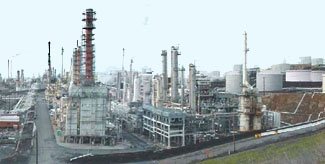Yersinia pestis: Difference between revisions
imported>Ariana Aronis |
imported>Ariana Aronis |
||
| Line 36: | Line 36: | ||
Does it have any plasmids? Are they important to the organism's lifestyle? | Does it have any plasmids? Are they important to the organism's lifestyle? | ||
The genome structure has been decoded for two of the three sub-species of Yersinis pestis, the KIM strain and the CO92 strain. The chromosome of the KIM strain contains 4,600,755 base pairs and the chromosome of the CO92 strain has 4,653,728 base pairs. Yersinia pestis is also the host to the plasimds pCD1, pPCP1, and pMt1 which along with a pathogenicity island called HPI encode the proteins that cause the infamous pathogenicity of the bacteria. These virulence factors are essential for the invasion of the bacteria into the host, and the injection of its proteins into the cell. | The genome structure has been decoded for two of the three sub-species of Yersinis pestis, the KIM strain and the CO92 strain. The chromosome of the KIM strain contains 4,600,755 base pairs and the chromosome of the CO92 strain has 4,653,728 base pairs. There are 4,012 protein-coding genes (including 149 pseudogenes). Yersinia pestis is also the host to the plasimds pCD1, pPCP1, and pMt1 which along with a pathogenicity island called HPI encode the proteins that cause the infamous pathogenicity of the bacteria. These virulence factors are essential for the invasion of the bacteria into the host, and the injection of its proteins into the cell. | ||
==Cell structure and metabolism== | ==Cell structure and metabolism== | ||
Revision as of 09:28, 29 March 2008
Articles that lack this notice, including many Eduzendium ones, welcome your collaboration! |
Classification
Higher order taxa
Domain: Eubacteria
Phylum: Proteobacteria
Class: Gamma Proteobacteria
Order: Enterobacteriales
Family: Enterobacteriaceae
Genus: Yersinia
Species: Yersinia Pestis
Species
Yersinia pestis
Description and significance
Describe the appearance, habitat, etc. of the organism, and why it is important enough to have its genome sequenced. Describe how and where it was isolated. Include a picture or two (with sources) if you can find them.
Genome structure
Describe the size and content of the genome. How many chromosomes? Circular or linear? Other interesting features? What is known about its sequence? Does it have any plasmids? Are they important to the organism's lifestyle?
The genome structure has been decoded for two of the three sub-species of Yersinis pestis, the KIM strain and the CO92 strain. The chromosome of the KIM strain contains 4,600,755 base pairs and the chromosome of the CO92 strain has 4,653,728 base pairs. There are 4,012 protein-coding genes (including 149 pseudogenes). Yersinia pestis is also the host to the plasimds pCD1, pPCP1, and pMt1 which along with a pathogenicity island called HPI encode the proteins that cause the infamous pathogenicity of the bacteria. These virulence factors are essential for the invasion of the bacteria into the host, and the injection of its proteins into the cell.
Cell structure and metabolism
Describe any interesting features and/or cell structures; how it gains energy; what important molecules it produces.
Ecology
Describe any interactions with other organisms (included eukaryotes), contributions to the environment, effect on environment, etc.
Pathology
How does this organism cause disease? Human, animal, plant hosts? Virulence factors, as well as patient symptoms.
Application to Biotechnology
Does this organism produce any useful compounds or enzymes? What are they and how are they used?
Current Research
Enter summaries of the most recent research here--at least three required

